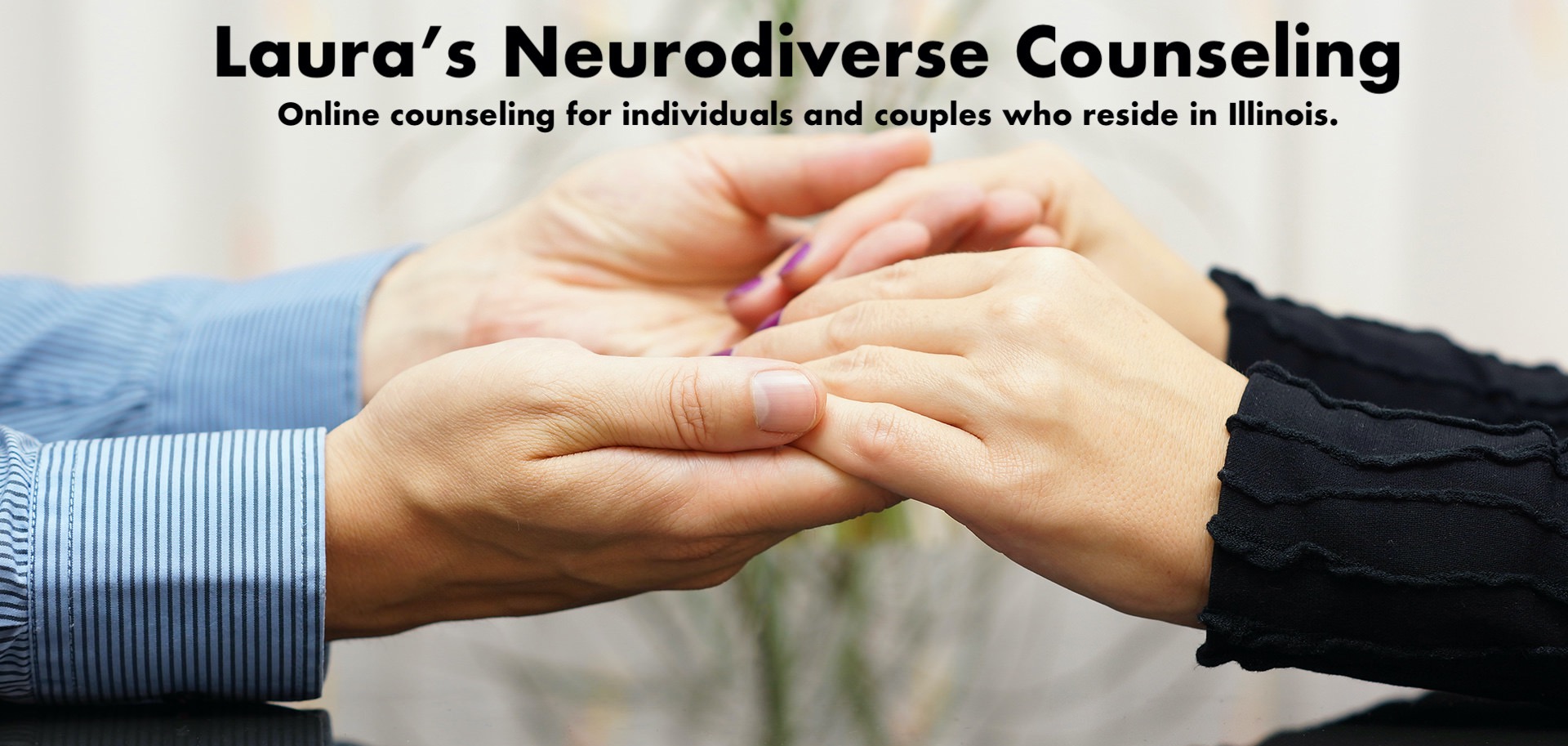About Laura

Her additional Certifications include:
- (Couples Therapy) The Gottman Method Level 1 Clinical Training
- (Hypnosis Therapy) Rapid Resolution Therapy (RRT) Level 2
- Advanced Master Program on the Treatment of Trauma
- Advanced Nutritional and Integrative Medicine for Mental Health Professionals.
Due to Illinois Professional Licensing laws, Laura is limited to counseling those who reside in Illinois. If you do not reside in Illinois, please continue your search for a licensed mental health professional in your state/country who does specialize in neurodiverse adult relationships. Additionally, specifically trained (non-licensed or inactive licensed) “coaches and/or experts” with neurodiverse backgrounds can still be extremely helpful. While they are limited in providing mental health and emotional healing components of traditional therapy, they may be qualified to teach couples and individuals skills and goal based guidance for this specialty which are useful components toward positive change.
Neurodiverse relationships are complex and unique
Reciprocal Communication is the lifeblood of EVERY relationship.
When things are going right, you feel:
- Heard
- Validated
- Understood
- Accepted
- Loved
I improve outcomes for your quality of life.
I help couples get “un-stuck” from years of misinformation and miscommunication.
I support individuals in redefining their needs and identities while transcribing, translating, and teaching couples to tailor their communication skills to what works for them.
I work with all combinations of couples and individuals, diagnosed or not, who struggle with communication, intimacy, resentment, confusion, and their own brain wiring challenges that we uncover on the way. Symptoms of anxiety and depression tend to accompany most neurodiverse issues. You are not alone here!
Additionally, I facilitate a monthly online Neurotypical Women’s Educational Support group entitled “WAM: What About Me?”
The catch is that you need to be willing and ready to work. I don’t fix or change people. I don’t take sides, but I’ll empathize. I work with you and your partner to create increased awareness of the self. When you are aware of your thoughts, moods, personality traits, and how your body physically feels, you can then choose to work on your challenges and accentuate your strengths. When you change your thoughts, you change where your energy is focused. Apply your energy toward positive behavioral change and eventually you aren’t the same person anymore. It’s an equation that can be solved.


Think about what could go right


Neurodiversity
I’ve been counseling since 2006. The concept along with advocacy for neurodivergent adults was hardly on the radar for counselors, as autism in children and ADHD (primarily targeted toward young males) was on a continued trend into the early 2000’s. For older individuals and couples, there was even less information about “what to do,” or “how to assess” autism or ADHD to even acknowledge how much neurodiversity affects our relationships and well-being. Whether it’s Autism Spectrum Disorder (ASD), ADHD, sensory processing disorders, or the growing list of neurodivergent diagnoses, I hold credence to autism activist Steven Shore’s “If you’ve met one individual with autism, you’ve met one individual with autism.” Same principle holds with all neurodivergent individuals. The uniqueness and complexity of the brain and body connection is a never ending evolution, perhaps even a revolution.
Neurodiverse couples are complex territory in the world of counseling that well-intended therapists may have missed along the way. I know this because I was one of those “well-intended therapists.” To add to the complexity, neurodivergent individuals often suffer with co-morbidities such as anxiety, depression, and OCD, (among other struggles) which are issues I most frequently experience with my clients.
The person who’s not on the autism spectrum (termed Neurotypical) has equal work to do, sometimes more, depending on their history and health status. Neurotypicals most often face the same issues as their partner: anxiety, depression, and OCD, and PTSD. They frequently suffer from long term physical illnesses as a consequence of their body being in a stressed state for too long. Loneliness, anger, low-confidence, and loss of identity are top on the list of problems experienced.
The few professionals who have training and skills in this specialty are better at recognizing and understanding differences, and aren’t in this niche to “fix” or blame either partner. Instead, they strive to create common ground between a couple, their families, and those who matter most to them. I serve as a gifted “bridge maker” between neurotypical and neurodivergent minds.
Brain wiring differences matter more than we realize!
Neurotypical:
(non-autistic / typical neurological development / functioning)
“You’re not crazy!”
But you may be wondering:
Should I stay or should I go?
Why can’t my partner understand my needs?
Why doesn’t he/she accept that they are on the spectrum? Will they ever admit it?
How can I try to make us work again?
Neurodivergent:
(you have traits on the Autism spectrum or another a-typical brain type, but may not be aware of it)
“You’re not “broken” or always wrong.”
But you may be wondering:
If I am on the Spectrum (or similar), what does that mean? Why is that such a big deal?
I don’t understand the what the problem is.
I have no clue how to start fixing this relationship.
I don’t want to change, I’m fine. Counseling isn’t for me.


My path toward Neurodiverse Counseling
My neurodiverse counseling specialty began on a personal level in 2017.
I learned that my husband of nearly 20 years was on the Autism spectrum. I am considered neurotypical. Many of my immediate family members are also neurodivergent, some diagnosed, some not. I love them all, but it changed my perspective on absolutely everything about our life together. “Wish we would have known this earlier” was the understatement that echoed this discovery.
As Maya Angelou said, “You do better when you know better.”
It was then that I furthered my education through the Asperger/Autism Network (AANE) to learn the nuances of neurodiverse couples, namely in communication and understanding brain wiring differences that science is well able to prove. The result is that my personal life experiences combined with my 15+ years of clinical knowledge yields both creative and research-based solutions, customized to your specific issues.
I know “know better” and cannot “unsee” from a neurodiverse lens. As I continue my personal journey, I remain equally as passionate professionally to assist others in their relationships because I live in my neurodiverse world 24/7.
Whom do I work with?
I predominately work with adult couples and individuals where one person is on the Autism spectrum, diagnosed or suspected. Often, other combinations in couples present themselves, such as a spouse with ADHD, or when both partners learn they are neurodivergent. Females on the spectrum often present differently than males, but the issues they contend with are similar to males on the spectrum in terms of how the world receives them. Usually I work with one or both parties individually, and then together as a couple as needed. I often work with individuals when their spouse is unwilling to attend counseling. Gender and sexual identity in relationships matter not to me. It is common for couples to have individual counselors or coaches to work with simultaneously, for which I’m pleased to refer and consult with as needed for a true continuum of care.


To diagnose, or not to diagnose, that is the question....
Sometimes it’s therapeutic to receive a formal, clinical diagnosis, but other times it’s not direly or worthwhile. That said, it’s important to remember that undiagnosed or misdiagnosed individuals can suffer unnecessarily as well. Co-morbid (co-existing) mental health issues will also largely effect successful outcomes. I do not perform formal spectrum diagnosis and testing, but I screen, assess, and educate on all topics related to neurodiverse co-existence, and will tell you (and your partner) if you are NOT on the spectrum. I am qualified to diagnose mental health disorders from the DSM if it is relevant to our work together. I will also serve as your compass for further resources as needed.
More Thoughts
“There is no standard brain.” -Thomas Armstrong, Ph.D.
“There is no standard brain.” -Thomas Armstrong, Ph.D.
The world is more neurodiverse than we think, and we are slowly awakening toward one size doesn’t fit all, or most. Understanding our brain wiring differences takes specific communication skills, time, and a mountain of energy. It is possible. Hope isn’t dead. This unique journey you’re on cannot be compared to couples or individuals who are not in neurodiverse relationships.
Sometimes, sadly but for the better in the long run for some, neurodiverse relationships don’t workout. I can take you through the decision process to “stay or go” as well. There’s a difference process and path we take for discernment counseling, and I serve as your educated guide, on one or both sides of the relationship.
Have I mentioned children yet? Many clients discover their own neurodivergent selves after their children receive a formal diagnosis. Sibling and parenting issues often arise as well. Moreover, one of you may have had numerous “a-ha” moments gleaned from social media or TV shows featuring autistic individuals that made you think about your relationships. Your intuition may have guided your research to confirm suspicions of your loved one being on the spectrum, but you may have continued doubts. I work with families on occasion when neurodiversity needs introduction and as changes occur in the household.


Common Themes
Over time I’ve gathered a compilation of quotations from clients and the neurodiverse community. I’ve amended them in order to shorten the massive list and scope of issues partners face to give you an idea of how partners in relationships feel and experience their perspective when living as a neurodiverse couple. I use the pronoun “he” in many examples but I’m aware and honor that neurodiverse relationships include both sexes and all gender identities. If any of this resonates with you, you are in the right place.
Services
Although Laura provides Telehealth (online only) counseling to her established clients, her counseling services for new clients and couples at this time are not available.
Please check back, as this website will be updated when new clients will have an opportunity to work with Laura.
If you interested in joining Laura’s monthly Neurotypical Women’s Educational Support Group (WAM), please inquire below for more information.
Self-pay from clients are due at the time of service. One hour individual sessions start at $180 paid upfront. Initial paperwork and assessments add additional fees (one time only) for the start of counseling and will be outlined specifically in the paperwork once a schedule has been mutually established. Laura is out of network with all insurance providers but will provide a Superbill for possible reimbursement incumbent with your specific healthcare plan.

I currently have a waiting list for new clients.


